funeral
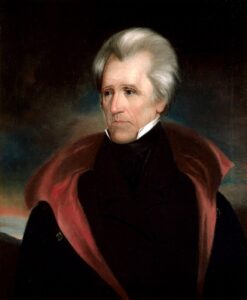 I’m not sure why it is that every president “needs” a pet. Nevertheless, it seems that it is expected, and the “first dog” seems to be the most common choice of pet. Dogs are the most commonly talked about pets in the White House…in recent years anyway. The fact is that ever since George Washington, there has been a myriad of different animals that earned the title of presidential pet or first pet. Some of the more manageable animals to come under the care of the president were cats, horses, donkeys, cows, goats, and hamsters. Oddly, there were also the more “unique” animals that lived in the White House too, including, and often only temporarily, bobcats, raccoons, lions, tigers, and bears, if you can believe it.
I’m not sure why it is that every president “needs” a pet. Nevertheless, it seems that it is expected, and the “first dog” seems to be the most common choice of pet. Dogs are the most commonly talked about pets in the White House…in recent years anyway. The fact is that ever since George Washington, there has been a myriad of different animals that earned the title of presidential pet or first pet. Some of the more manageable animals to come under the care of the president were cats, horses, donkeys, cows, goats, and hamsters. Oddly, there were also the more “unique” animals that lived in the White House too, including, and often only temporarily, bobcats, raccoons, lions, tigers, and bears, if you can believe it.
One of the more common kind of animals was the variety of birds that have worn the title pf presidential pet. Birds, such as turkeys, mockingbirds, parakeets, and several other species of parrot and songbird have been the companions of past presidents and their families. One of the presidents that had a bird was Andrew Jackson, the seventh president, who owned a variety of pets, among them, an African grey parrot named Poll that he had purchased for his wife, Rachel. Unfortunately, had very little influence on Poll, because she died of a heart attack not long after his election in 1828. Because of Rachel’s untimely death, and unlike other presidential parrots, Poll took on some of Jackson’s more unbecoming characteristics. To put it mildly, Andrew Jackson was 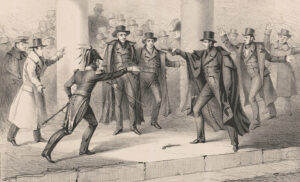 an exceptionally volatile individual who often disregarded formality. On the one hand, Jackson’s character helped him to actually survive an assassination attempt and to win the Battle of New Orleans. Both of these made him quite popular, even though the treaty that followed the battle, was almost pointless, and so the battle was viewed much the same. On the other hand, as both a general and later president, Jackson used every tool at his disposal to crush indigenous sovereignty. He really had no use for the Native Americans, or at least not for their rights as a sovereign nation. In fact, his actions both directly and indirectly caused the deaths of thousands of Native Americans.
an exceptionally volatile individual who often disregarded formality. On the one hand, Jackson’s character helped him to actually survive an assassination attempt and to win the Battle of New Orleans. Both of these made him quite popular, even though the treaty that followed the battle, was almost pointless, and so the battle was viewed much the same. On the other hand, as both a general and later president, Jackson used every tool at his disposal to crush indigenous sovereignty. He really had no use for the Native Americans, or at least not for their rights as a sovereign nation. In fact, his actions both directly and indirectly caused the deaths of thousands of Native Americans.
Nevertheless, where Poll was concerned, the loss of Rachel and Jacksons crude talk led to a number of problems later on. Poll was therefore almost constantly exposed to the already foul-mouthed and hot-tempered president. I don’t suppose all that matter very much to Jackson, who was obviously used to his own way of speaking, but on the day of Jackson’s funeral, it was decided by Jackson, that Poll was to be in attendance, 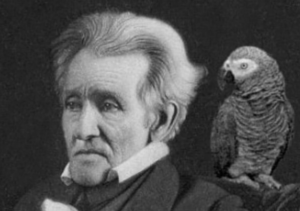 along with the grieving spectators. I can only imagine the guests, especially of that era, Jackson passed away on June 8, 1845, when after possibly being unnerved by the number of people, Poll proceeded to shock all of the guests when he began to exclaim all sorts of profanity and otherwise inappropriate language. According to witnesses, Poll’s outbursts were so disruptive that the bird had to be escorted away from the proceedings. Even after his departure, I’m sure that the prim and proper ladies and gentlemen had to take a moment to compose themselves before the funeral could continue. I guess it just goes to show that sometimes, more than just our children are listening to every word we say.
along with the grieving spectators. I can only imagine the guests, especially of that era, Jackson passed away on June 8, 1845, when after possibly being unnerved by the number of people, Poll proceeded to shock all of the guests when he began to exclaim all sorts of profanity and otherwise inappropriate language. According to witnesses, Poll’s outbursts were so disruptive that the bird had to be escorted away from the proceedings. Even after his departure, I’m sure that the prim and proper ladies and gentlemen had to take a moment to compose themselves before the funeral could continue. I guess it just goes to show that sometimes, more than just our children are listening to every word we say.
 It’s a sad thing when someone dies with no next of kin…no friends or loved ones to see to funeral arrangements, last wishes, or even, to attend the funeral. I suppose for the most part, the unfortunate departed one would probably be cremated and no funeral would be held…at least in most places that would be the case. That seems even more sad than someone who lived their last days alone, with no friends and no family. It’s almost like being thrown away.
It’s a sad thing when someone dies with no next of kin…no friends or loved ones to see to funeral arrangements, last wishes, or even, to attend the funeral. I suppose for the most part, the unfortunate departed one would probably be cremated and no funeral would be held…at least in most places that would be the case. That seems even more sad than someone who lived their last days alone, with no friends and no family. It’s almost like being thrown away.
In Amsterdam, however, they just can’t stand the thought of such a sad end to such a sad life. So, they began a tradition. In a heart-warming tribute to those lost souls who pass without any next of kin or friends, a poet will write a poem and even recite it at the funeral. What an incredible act of kindness and compassion!! These poets are not paid for their services, and yet they take to time to write a poem specifically for the newly departed person, even though the poet never knew the departed.
poem and even recite it at the funeral. What an incredible act of kindness and compassion!! These poets are not paid for their services, and yet they take to time to write a poem specifically for the newly departed person, even though the poet never knew the departed.
Frank Starik leads a group of poets in Amsterdam. These poets attend the funerals of the city’s “unmourned” dead, remembering them with a specially composed poem. “I want to give them back a life, a history” he told Reuters reporter Alexandra Hudson. The social services in Amsterdam bury around 250 people a year, and about 15 of those depart with no trace of relatives or friends. For most of us that seems unheard of and shocking, but I suppose that these people are often buried or cremated with little fanfare, so we rarely hear anything about them, but these are the cases closely watched by the poet group, so they can step in and give their own tribute and a labor of compassion and love for a person who had no one to love them. While the poets write their poems, the city contributes by providing a coffin, bouquet of flowers, and even plays music 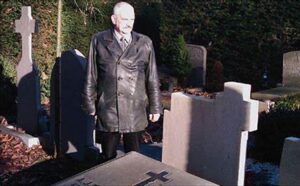 best guessed to be the deceased’s choice of music. I’m not sure how they know what music to use, but maybe they look at the things in the deceased’s home, or anything else like name the wearing of a cross. I love these acts of kindness, and what social worker told Reuters when he said, “Everyone in Amsterdam – rich or poor – should have a dignified funeral, with flowers, with coffee and some thoughts about their life. We are not responsible for how they lived, but we are responsible for them in death, and if they died in Amsterdam then they are one of us.” I can’t think of an act of kindness that is more touching than this. Well done, Amsterdam. Well done.
best guessed to be the deceased’s choice of music. I’m not sure how they know what music to use, but maybe they look at the things in the deceased’s home, or anything else like name the wearing of a cross. I love these acts of kindness, and what social worker told Reuters when he said, “Everyone in Amsterdam – rich or poor – should have a dignified funeral, with flowers, with coffee and some thoughts about their life. We are not responsible for how they lived, but we are responsible for them in death, and if they died in Amsterdam then they are one of us.” I can’t think of an act of kindness that is more touching than this. Well done, Amsterdam. Well done.
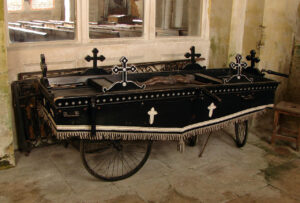
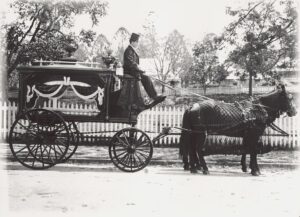 When the first cemeteries were set up, there were no automobiles, so the casket was transported by a horse or ox drawn wagon. This wasn’t exactly a luxury final ride to the final resting place, but I suppose the “honored guest” didn’t know the difference. Sometimes, when the deceased had lived way out in the country, the family chose to bury them on the property, but when they didn’t, the ride to the final resting place was a long one, and rather hard on the families, because it left so much time to just think. In many of these cases, the family had to build a casket before they could bury it. Planned funerals were very unusual. People didn’t often go to the undertaker and sit down to figure it all out, so the casket was also not planned. It gives a whole new perspective to the reason for waiting several days for the burial. We think there is a lot to plan these days…not really so much.
When the first cemeteries were set up, there were no automobiles, so the casket was transported by a horse or ox drawn wagon. This wasn’t exactly a luxury final ride to the final resting place, but I suppose the “honored guest” didn’t know the difference. Sometimes, when the deceased had lived way out in the country, the family chose to bury them on the property, but when they didn’t, the ride to the final resting place was a long one, and rather hard on the families, because it left so much time to just think. In many of these cases, the family had to build a casket before they could bury it. Planned funerals were very unusual. People didn’t often go to the undertaker and sit down to figure it all out, so the casket was also not planned. It gives a whole new perspective to the reason for waiting several days for the burial. We think there is a lot to plan these days…not really so much. 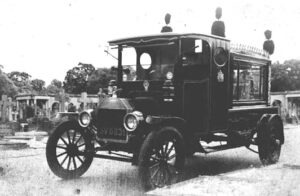
Hearses were originally “hand-drawn then horse-drawn after the decoration and weight of the hearse increased. The first electric motorized hearses were introduced to the United States in the early 1900s. Petrol-powered hearses began to be produced from 1907 and, after a slow initial uptake due to their high cost, became widely accepted in the 1920s. The vast majority of hearses since then have been based on larger, more powerful car chassis, generally retaining the front end up to and possibly including the front doors but with custom bodywork to the rear to contain the coffin.” On January 15, 1909, came the first use of an automobile hearse in a funeral.
While the first hearse was quite different from the hearses of today, it was really quite ornate. The hearses of today, might seem normal and average, but in some instances, they can be quite unusual too. One hearse I found, really surprised me. If you happen to be a motorcycle fan, you might be interested to know that there is actually a motorcycle hearse. It is a one rider affair, with a very interesting “sidecar” to hold the casket. It is a 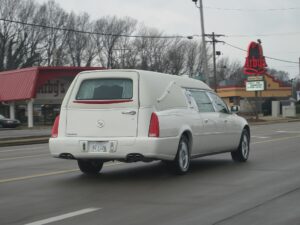
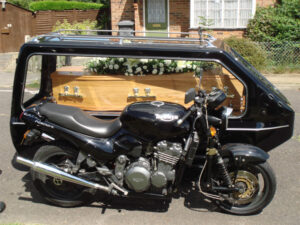 far cry from the original horse-drawn version, and definitely different from the hand cart version. While funerals these days are unique to the deceased, and that is what makes them beautiful, they were often very plain in times past. Everyone pretty much had the same service with the same songs, and the same words spoken. These days, funerals…planned mostly by the family, are very personalized, sometimes right down to the type of hearse.
far cry from the original horse-drawn version, and definitely different from the hand cart version. While funerals these days are unique to the deceased, and that is what makes them beautiful, they were often very plain in times past. Everyone pretty much had the same service with the same songs, and the same words spoken. These days, funerals…planned mostly by the family, are very personalized, sometimes right down to the type of hearse.
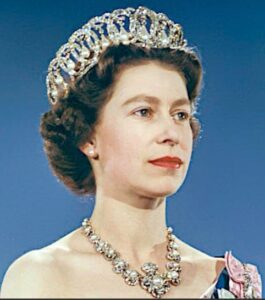
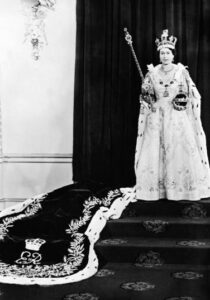 Sad news has surfaced today out of Scottland, as Queen Elizabeth of England has passed away at the age of 96 years. She became the Queen of England in 1952 at the very young age of 25, when her father, King George VI passed away on February 6, 1952, at just 56 years old. Queen Elizabeth would later become the longest reigning British monarch in history, reigning for 7 decades. The queen celebrated her Platinum Jubilee (70 years as reigning monarch) on February 5, 2022. She knew that her time was short, and she spoke of her wishes for the time following her death. Now that time has come.
Sad news has surfaced today out of Scottland, as Queen Elizabeth of England has passed away at the age of 96 years. She became the Queen of England in 1952 at the very young age of 25, when her father, King George VI passed away on February 6, 1952, at just 56 years old. Queen Elizabeth would later become the longest reigning British monarch in history, reigning for 7 decades. The queen celebrated her Platinum Jubilee (70 years as reigning monarch) on February 5, 2022. She knew that her time was short, and she spoke of her wishes for the time following her death. Now that time has come.
The family will not have to make any arrangements for her funeral, because everything has already been planned from the service to the grave, and even the timeframe. The only unknown, until now, was the date of the service, which will be held eleven days after her passing…on September 19, 2022. I think it is comforting when the deceased has already planned their own funeral. It is to their tastes and preferences, and there is no question 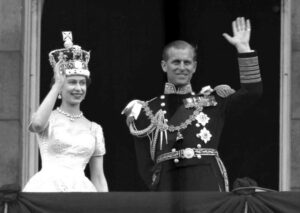 as to their wishes. Queen Elizabeth’s funeral will be televised across the world, with the only restriction being that the royal family is not to be filmed. That makes sense. They need to be able to grieve privately.
as to their wishes. Queen Elizabeth’s funeral will be televised across the world, with the only restriction being that the royal family is not to be filmed. That makes sense. They need to be able to grieve privately.
The royal line of succession now changes, with Prince Charles becoming King Charles III (it was announced earlier). He has the right to change his name, but it appears that he won’t. Prince William is now first in line to the throne and takes on his father’s title of Prince of Wales. Duchess Camilla becomes Queen Consort, and Duchess Catherine becomes Princess of Wales. Prince George is second in line to the throne, followed by Princess Charlotte and Prince Louis. It is so strange to think of so many changes happening all at once, but that is how things work in the world of the monarchy. How people feel personally about any part of the changes really doesn’t matter, because they are what they are.
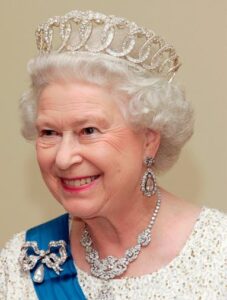
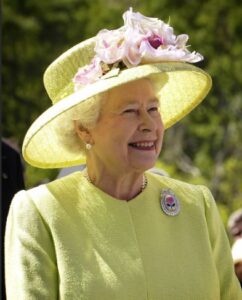 For the world, this is a sad day. It is the end of an era. Many people, including me, have never known a time when Queen Elizabeth II was not the queen. She began her reign four years before I was born. Queen Elizabeth II was much loved and well respected. She had a way of making people feel at ease. She had a very human type of nature, and really never presented herself as anything so special. She went out and shook the hands of the people, in what was deemed a “walkabout” like the Australians do. She considered her office one of service to the people, rather than a ruler over them. I’m sure that is why she was so loved by all. The end of her reign has brought much sadness to the world. Rest in peace Queen Elizabeth. You will be missed by so many people.
For the world, this is a sad day. It is the end of an era. Many people, including me, have never known a time when Queen Elizabeth II was not the queen. She began her reign four years before I was born. Queen Elizabeth II was much loved and well respected. She had a way of making people feel at ease. She had a very human type of nature, and really never presented herself as anything so special. She went out and shook the hands of the people, in what was deemed a “walkabout” like the Australians do. She considered her office one of service to the people, rather than a ruler over them. I’m sure that is why she was so loved by all. The end of her reign has brought much sadness to the world. Rest in peace Queen Elizabeth. You will be missed by so many people.
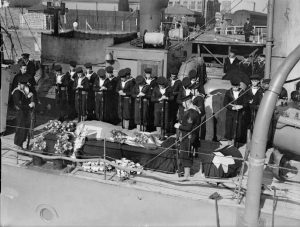
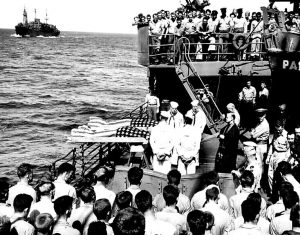 Most of us really don’t want to think about our own funeral, but when men are at war, death and a funeral become a subject they have to think about. They don’t want to, but they have no guarantee that they will return home, so they are faced with the possibility of death every day. In the Navy, during wartime, at least in the past, if not currently, it was common practice to bury the casualties at sea. That is such a hard concept for me, and yet there isn’t really anything wrong with it. I guess that having no grave site to visit is probably the thing that is bothering me the most. It’s not that I spend days and hours at the cemetery, but rather that I know exactly where my loved ones are laid to rest, or where I will be.
Most of us really don’t want to think about our own funeral, but when men are at war, death and a funeral become a subject they have to think about. They don’t want to, but they have no guarantee that they will return home, so they are faced with the possibility of death every day. In the Navy, during wartime, at least in the past, if not currently, it was common practice to bury the casualties at sea. That is such a hard concept for me, and yet there isn’t really anything wrong with it. I guess that having no grave site to visit is probably the thing that is bothering me the most. It’s not that I spend days and hours at the cemetery, but rather that I know exactly where my loved ones are laid to rest, or where I will be.
Burials at sea have been going on as long as men have been going to sea. For logical reasons, a body could not be kept on board a ship for the remainder of the cruise, so the death had to be dealt with. In early days, the body was wrapped in a shroud, usually made of sailcloth, but later caskets were also used. If the family has decided to use a casket instead of a shroud for the burial at sea, the casket must be a metal casket, because it must be able to deteriorate in the marine environment. I suppose that makes sense, because eventually ships and planes return to the environment around them. The sea eventually claims what doesn’t belong there naturally. Of course, the timeframe involved in the deterioration of the casket would be well beyond the lifetime of the families, so I guess that would make it easier to think about it.
Military burials at sea are performed with much pomp and circumstance. The honor of the soldier is held in the highest regard. The personnel who participate or even attend the services must wear the Uniform of the Day. The commanding officer tries to have a chaplain of the appropriate faith perform the ceremony, but if that is not an option, the service may be read by the commanding officer or an officer designated by him/her. The service is much like a church service, with a eulogy, firing squad salute, pall bearers, and a flag ceremony. When everything is finished, the body is moved to the side of the ship of a plank and then the plank is raised so that the casket or shrouded body slides off into the sea.
Of course, when a ship sinks, there is an instant burial at sea for all who do not survive. Many times the ship is not found for years, so the ship becomes the casket for all those who lost their lives. The family can seek to have the body recovered when the ship is found, but often that does not happen. The USS Arizona is probably 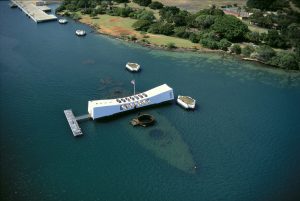
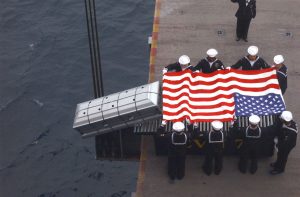 one of the most well known casket ships in the world, and while it was easy to see and get to, many of the families chose to leave their loved ones there. The USS Arizona went down with 1,177 Sailor and Marines on board. The ship marks the final resting spot of 1,102 of the original 1,177. Also, beginning in 1982, the US Navy has allowed surviving crew members to be “buried” on the Arizona.
one of the most well known casket ships in the world, and while it was easy to see and get to, many of the families chose to leave their loved ones there. The USS Arizona went down with 1,177 Sailor and Marines on board. The ship marks the final resting spot of 1,102 of the original 1,177. Also, beginning in 1982, the US Navy has allowed surviving crew members to be “buried” on the Arizona.
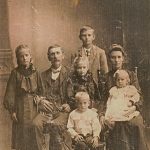
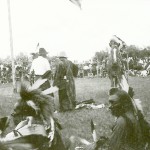 My great grandfather, Cornelius Byer was a kind and a fair man. He was generous and honest. It was these qualities that earned him the respect of the Indian tribes in the Gordon, Nebraska area. Great Grandpa passed away on October 23, 1930, but the celebration of life, really began before the day of the funeral, and even before he passed away. Over the years of his life, my great grandfather became a great friend of the Indians. He was invited to their pow wows, he was asked his opinions on things…and they listened when he spoke. He was helpful to the Indian tribes, and they, in turn treated him with great respect.
My great grandfather, Cornelius Byer was a kind and a fair man. He was generous and honest. It was these qualities that earned him the respect of the Indian tribes in the Gordon, Nebraska area. Great Grandpa passed away on October 23, 1930, but the celebration of life, really began before the day of the funeral, and even before he passed away. Over the years of his life, my great grandfather became a great friend of the Indians. He was invited to their pow wows, he was asked his opinions on things…and they listened when he spoke. He was helpful to the Indian tribes, and they, in turn treated him with great respect.
The Indians would often show up at his home…something that would most likely panic most people. Most often the women and children would stay outside, while the men went in to visit with Great Grandpa. It was another show of respect. The Indians often camped near the house when the men were visiting. I’m sure it was a very interesting lifestyle for my grandmother.
While all that was interesting, probably the most interesting thing happened as Great Grandpa was dying and after his passing. When he lay dying, the Indians came…long lines of them. Each one, including the women and 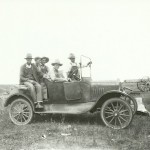
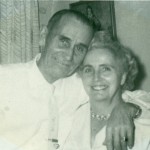 children, passed by his bed. They spoke words of respect and admiration. I’m sure it took hours, but none were turned away. Great Grandma knew how much they loved him, and how much they needed to say goodbye. I would love to have had the chance to see that scene. These were two groups of people who normally didn’t get along, and yet they showed so much love and respect for one another. There was no warring with, no stealing from, no depriving of one another. There was simply love and respect. I’m sure it made my Great Grandmother Edna (Fishburn) Byer and their children feel very safe over the years.
children, passed by his bed. They spoke words of respect and admiration. I’m sure it took hours, but none were turned away. Great Grandma knew how much they loved him, and how much they needed to say goodbye. I would love to have had the chance to see that scene. These were two groups of people who normally didn’t get along, and yet they showed so much love and respect for one another. There was no warring with, no stealing from, no depriving of one another. There was simply love and respect. I’m sure it made my Great Grandmother Edna (Fishburn) Byer and their children feel very safe over the years.
My grandfather, George Byer arrived at the homestead on October 20, 1930. My grandmother, Hattie Byer stayed home with their newborn daughter, Virginia, who was just 4 months old at the time. Grandpa brought almost 2 year old Evelyn with him. His letter at the time said that all the children were there, or soon would be. Three days later, Great Grandpa Cornelius Byer passed away. I’m so glad my grandpa got to see his dad before he passed. When it was time to have the funeral, they would have to travel into Gordon, Nebraska. We would never think of transporting our own loved one to the funeral, but those were different times. Nevertheless, the 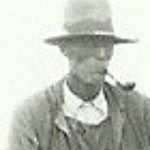
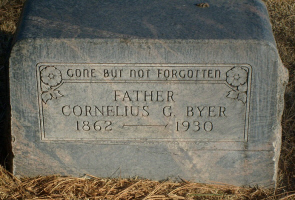 Indians would not leave their dear friend to go alone. With the casket in a wagon, and his son driving, Great Grandpa went to his funeral. Little Evelyn sat in the back of the wagon, wide-eyed in wonder as a long line of Indians followed the procession to the cemetery. In death, as in life, their respect for this man, who was my great grandfather, was on display. I can’t think of a greater honor than this. Cornelius Byer was truly loved and respected by all who knew him.
Indians would not leave their dear friend to go alone. With the casket in a wagon, and his son driving, Great Grandpa went to his funeral. Little Evelyn sat in the back of the wagon, wide-eyed in wonder as a long line of Indians followed the procession to the cemetery. In death, as in life, their respect for this man, who was my great grandfather, was on display. I can’t think of a greater honor than this. Cornelius Byer was truly loved and respected by all who knew him.
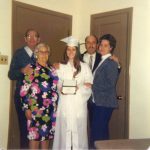 Recently, I heard a saying that has really made me think. “We take photos as a return ticket to a moment otherwise gone.” The thing about that thought that struck me the most, was when I considered moments otherwise gone…forever. I have always loved photography. From the time I was a little girl and received my first camera, I was hooked. There were years I wasn’t so good about taking pictures, and mistakes I made, such as not including people in my photos enough, not writing down the names of people and the locations, and the biggest one in my mind, not being in the pictures enough. So many people these day take selfies, and then there are the selfies that are ridiculed because “the person takes too many selfies.” I suppose that can be an issue, but when you think about it, they will always have that moment, and if that selfie made them look and feel especially pretty or handsome, so much the better. It is a moment, frozen in time…a memory that will always be with them.
Recently, I heard a saying that has really made me think. “We take photos as a return ticket to a moment otherwise gone.” The thing about that thought that struck me the most, was when I considered moments otherwise gone…forever. I have always loved photography. From the time I was a little girl and received my first camera, I was hooked. There were years I wasn’t so good about taking pictures, and mistakes I made, such as not including people in my photos enough, not writing down the names of people and the locations, and the biggest one in my mind, not being in the pictures enough. So many people these day take selfies, and then there are the selfies that are ridiculed because “the person takes too many selfies.” I suppose that can be an issue, but when you think about it, they will always have that moment, and if that selfie made them look and feel especially pretty or handsome, so much the better. It is a moment, frozen in time…a memory that will always be with them.
When I look back at the funerals of my parents and my father-in-law, and the slide shows we did for them, I  found myself amazed that I was having trouble locating pictures of me with them…particularly with my dad. It was a strange thing for me to realize that, until I thought about how much time I spent behind the camera and not in front of it. Since that time, I have made sure to take those pictures of my mom and me, my father-in-law, and me, and my mother-in-law and me, because I want to have those return tickets to those precious moments of the past. It’s not just about the slide show either, although that is a permanent memory of their lives, but it’s about the time spent with them. In his last two years, my dad and I spent many hours together, while I was one of his caregivers. I got to enjoy his wonderful sense of humor, as we teased each other every day. In my memory files, I can see him pretending to be asleep when I came in. Then, I would softly flick his hand, and he would accuse me of hitting him, saying, “Oh!! You struck me!” Then we would both laugh about it, because we knew that in a million years, that would never have happened. We pretended to argue, as I dressed his wounds, and helped him get dressed. Then I would step out while he finished the process, and he would come out into the living room. Whenever I am in their house, I can see those moments as vividly as if they were still there. Still, there are many moments that aren’t quite as clear, and a picture would tell the story
found myself amazed that I was having trouble locating pictures of me with them…particularly with my dad. It was a strange thing for me to realize that, until I thought about how much time I spent behind the camera and not in front of it. Since that time, I have made sure to take those pictures of my mom and me, my father-in-law, and me, and my mother-in-law and me, because I want to have those return tickets to those precious moments of the past. It’s not just about the slide show either, although that is a permanent memory of their lives, but it’s about the time spent with them. In his last two years, my dad and I spent many hours together, while I was one of his caregivers. I got to enjoy his wonderful sense of humor, as we teased each other every day. In my memory files, I can see him pretending to be asleep when I came in. Then, I would softly flick his hand, and he would accuse me of hitting him, saying, “Oh!! You struck me!” Then we would both laugh about it, because we knew that in a million years, that would never have happened. We pretended to argue, as I dressed his wounds, and helped him get dressed. Then I would step out while he finished the process, and he would come out into the living room. Whenever I am in their house, I can see those moments as vividly as if they were still there. Still, there are many moments that aren’t quite as clear, and a picture would tell the story 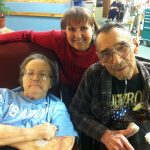 so well. And now that it is too late to take them, I really wish I had some of those moments in pictures.
so well. And now that it is too late to take them, I really wish I had some of those moments in pictures.
There are countless people who tell me how much they hate having their picture taken. I find that really sad, because it isn’t about them. They are denying others the right to have a return ticket to those precious moments. So few people think about it that way…until the day when they really wish they had a picture of them with someone special. That’s when it finally hits them. Pictures aren’t just something silly to post of Facebook. They are memories. They are return tickets to a moment otherwise gone. I think I’ve improved on those return tickets quite a bit, and for that, I am happy.
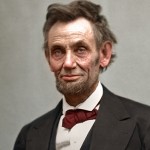 These days, when a new president makes the move from their current home to the White House, it is a huge production. Very little of the packing is actually done by the first family. Things were much different in 1861, when President Abraham Lincoln was moving to Washington DC. When Abraham Lincoln moved to Washington DC, he packed his family’s belongings himself. His wife Mary was in Saint Louis on a shopping trip, so she would join him later in Indiana. It was on this day, February 11, 1861 that Abraham Lincoln boarded a two car private train…probably the only special thing about this transition. After an emotional speech to his fellow Springfield, Illinois citizens, Abraham Lincoln moved to Washington DC. The day was cold and rainy…much like the mood as Lincoln left his friends. He spoke to a crowd before departing: “Here I have lived a quarter of a century, and have passed from a young man to an old man. Here my children have been born, and one is buried. I now leave, not knowing when, or whether ever, I may return, with a task before me greater than that which rested upon Washington. Without the assistance of that Divine Being…I cannot
These days, when a new president makes the move from their current home to the White House, it is a huge production. Very little of the packing is actually done by the first family. Things were much different in 1861, when President Abraham Lincoln was moving to Washington DC. When Abraham Lincoln moved to Washington DC, he packed his family’s belongings himself. His wife Mary was in Saint Louis on a shopping trip, so she would join him later in Indiana. It was on this day, February 11, 1861 that Abraham Lincoln boarded a two car private train…probably the only special thing about this transition. After an emotional speech to his fellow Springfield, Illinois citizens, Abraham Lincoln moved to Washington DC. The day was cold and rainy…much like the mood as Lincoln left his friends. He spoke to a crowd before departing: “Here I have lived a quarter of a century, and have passed from a young man to an old man. Here my children have been born, and one is buried. I now leave, not knowing when, or whether ever, I may return, with a task before me greater than that which rested upon Washington. Without the assistance of that Divine Being…I cannot 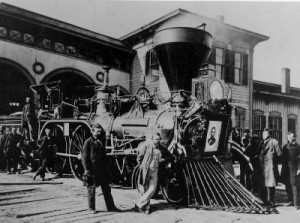 succeed. With that assistance, I cannot fail. To His care commending you, as I hope in your prayers you will commend me, I bid you an affectionate farewell.” One of the people who attended the speech, said that the president-elect’s “breast heaved with emotion and he could scarcely command his feelings.”
succeed. With that assistance, I cannot fail. To His care commending you, as I hope in your prayers you will commend me, I bid you an affectionate farewell.” One of the people who attended the speech, said that the president-elect’s “breast heaved with emotion and he could scarcely command his feelings.”
It’s hard to say if Lincoln had an inkling that he was not just saying “goodbye for now” to the citizens of Springfield, Illinois, or not, but there is no doubt that he knew that his presidency was going to be difficult…to say the least. Since his election, seven southern states has seceded from the Union. The nation was in the middle of a national crisis. President Lincoln knew that the nation was quite likely heading for a civil war. In short order, he was proven to be correct, when our nation embarked on one of the most bitter wars it ever fought…waged against its own people, over slavery.
When Lincoln said that it was possible that he would never return to Springfield, he was ironically very correct. 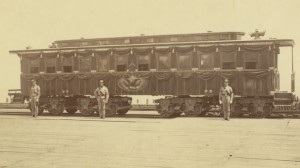 While he returned in body, he did not return in life…as we all know, because he was shot by John Wilkes Booth on April 14, 1865, and died at 7:22am the morning of April 15, 1865. Booth opposed Lincoln’s freeing of the slaves, and maybe felt like killing him would somehow change that. Of course, it did not. After his passing, Lincoln’s body made a two week train trip back to Springfield, Illinois for burial, taking a route that would allow the people to pay tribute along the way. Memorial services were held at different towns when the train passed through them. It was the only time he rode in the new private train car that had been built just for him.
While he returned in body, he did not return in life…as we all know, because he was shot by John Wilkes Booth on April 14, 1865, and died at 7:22am the morning of April 15, 1865. Booth opposed Lincoln’s freeing of the slaves, and maybe felt like killing him would somehow change that. Of course, it did not. After his passing, Lincoln’s body made a two week train trip back to Springfield, Illinois for burial, taking a route that would allow the people to pay tribute along the way. Memorial services were held at different towns when the train passed through them. It was the only time he rode in the new private train car that had been built just for him.
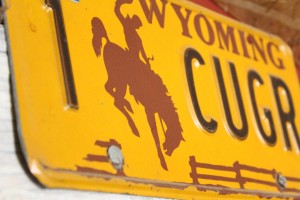
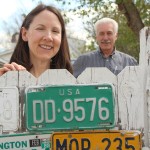 I don’t know for sure how it all started, but over the years, my father-in-law, Walt Schulenberg collected a number of old license plates that were both unique and average. My guess is that he found one that he really liked, and he saved it, putting it up on the wall of the garage. Before long, the number of plates grew, because there was always another unique license plate to add to the collection. After a while the license plate collection grew to include plates from the different states he had been in, and his son, Ron Schulenberg even brought him some from the countries he was in during Desert Storm…which were quite different from all the others.
I don’t know for sure how it all started, but over the years, my father-in-law, Walt Schulenberg collected a number of old license plates that were both unique and average. My guess is that he found one that he really liked, and he saved it, putting it up on the wall of the garage. Before long, the number of plates grew, because there was always another unique license plate to add to the collection. After a while the license plate collection grew to include plates from the different states he had been in, and his son, Ron Schulenberg even brought him some from the countries he was in during Desert Storm…which were quite different from all the others.
These license plates started out gracing the walls of the garage, which is a fitting place for such a collection, but as time went on, there were enough of then to warrant adding the barn shop my father-in-law had, and finally the back fence to his display areas. In reality, while I found these interesting to look at from time to time, my father-in-law’s license plate was not something that occupied any kind of a special place in my mind. I suppose that if I was a guy, I might have felt differently about it. It is a guy type of collection, after all.
After someone passes away, and you find yourself sorting through all their things, you begin to really get a feel for what was important to them. Not just the major things they had placed a high degree of importance on, but the lesser things too. The things they just liked, because they thought those things were cool. That was how it was for me, when we started going through my father-in-law’s things. No, I can’t say that I wanted those old license plates, but they were interesting. They were a reminder of my father-in-law, and the things he liked.
After the funeral, we took some pictures, as often happens after funerals, simply because many people who come, don’t live here and you want their pictures, because you don’t see them often enough. Many of the people in the family wanted their picture taken by the back fence, showing that collection of license plates. The other day, as I was looking through some of the old pictures, I came across those that were taken that day. It 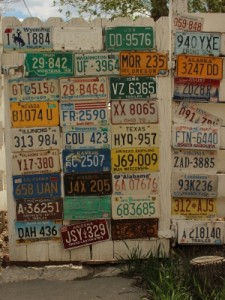
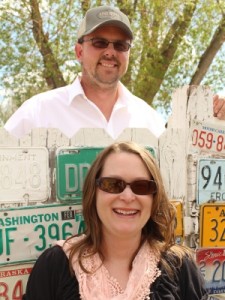 made me think with interest about the array of license plates my father-in-law had collected, and in reality about the kind of man he was.
made me think with interest about the array of license plates my father-in-law had collected, and in reality about the kind of man he was.
The things that were cherished to him were really the life moments. Things like his knife and watch, his tools, his woodworking supplies and chair making supplies, and yes, the license place collection, were things that had a special meaning to him. They were like the stories of his life. They were the accomplishments he had made, the places he had been, and the reminders of just how precious life was. While the license plates were not something I was interested in receiving, I am very glad that I have pictures of them to remember his passion for life.
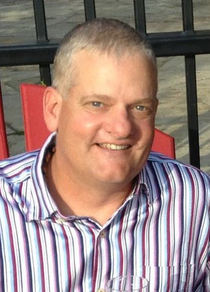 Yesterday, I attended the funeral of Casper firefighter, Captain Jeffrey Atkinson. The service was beautiful and filled with all the pomp and circumstance befitting a hero. The ceremony included bag pipes, the Shriner’s Calliope Band, the sounding of the last bell, and the presentation of the helmet, badge, and flag to his widow, Kristen and his sons Eddie and Christopf. There were tributes about his bravery, his humor, and his caring ways. He was a firefighter, but more than that he was a husband, father, son, brother, nephew, uncle, cousin, and friend. His family loved him so much, and now cancer had taken him from them. It was a terribly sad time for a lot of people, in the firefighting community and the entire city too.
Yesterday, I attended the funeral of Casper firefighter, Captain Jeffrey Atkinson. The service was beautiful and filled with all the pomp and circumstance befitting a hero. The ceremony included bag pipes, the Shriner’s Calliope Band, the sounding of the last bell, and the presentation of the helmet, badge, and flag to his widow, Kristen and his sons Eddie and Christopf. There were tributes about his bravery, his humor, and his caring ways. He was a firefighter, but more than that he was a husband, father, son, brother, nephew, uncle, cousin, and friend. His family loved him so much, and now cancer had taken him from them. It was a terribly sad time for a lot of people, in the firefighting community and the entire city too.
As I sat there listening to the ceremony, my mind drifted back over the last nine years, and my own encounters with Jeff and the other firefighters. As a caregiver for my parents and my in-laws over the past nine years, there have been more occasions than I care to think about when I would have to call for an ambulance for my loved ones. As most of you know, the fire department is often the first responder on those occasions. Since my husband Bob had been the fire department mechanic for many years, the firefighters knew me, but it wouldn’t have mattered. They weren’t just there because they knew Bob and me, they were there because they care about the people of Casper…or anyone in need.
Jeff and a number of other firefighters came to my rescue on more occasions than I want to think back on. In nine years of caregiving, there have been dozens of times when I had no other choice but to seek help in emergency situations. The firefighters and ambulance personnel were always professional, caring, and gentle with my parents and in-laws, but the firemen always seemed to look beyond just the patient. They saw me…standing there in the middle of it all, trying desperately to stay in control of my emotions long enough to be able to give them the information they needed in order to help their patient…my loved one.
At the time of those calls, I didn’t know if my loved one was going to make it through this. I felt like I was falling into a bottomless pit. Those were the worst moments of my life, and they saw me at my absolute worst. It didn’t matter to them. They saw that I was scared and trying desperately to hold myself together. It was at that point, as the EMTs were taking my loved one out to the ambulance that the firefighters turned their attention to me, asking if I was ok. Of course, that was the breaking point for me, and the tears flowed. Several of the firefighters, including Jeff took it upon themselves to give me the hug I really needed, and the encouragement to go forward and make my way to the hospital to give the information needed to the hospital staff too. I don’t think I could have made it without that hug. A hug might seem like such a small thing, but when your parents are sick and you have to be the one to make all the decisions about their care, it can feel so overwhelming. I felt lost and alone. They showed me that I wasn’t alone after all. With Jeff’s passing, the city of Casper has lost a great firefighter.

